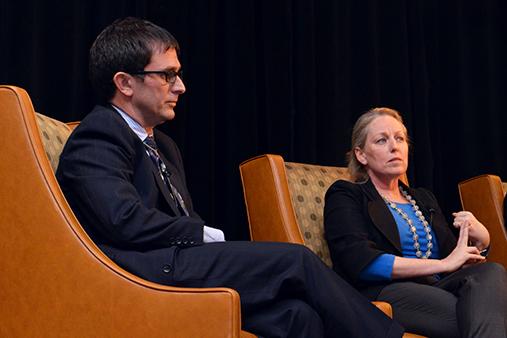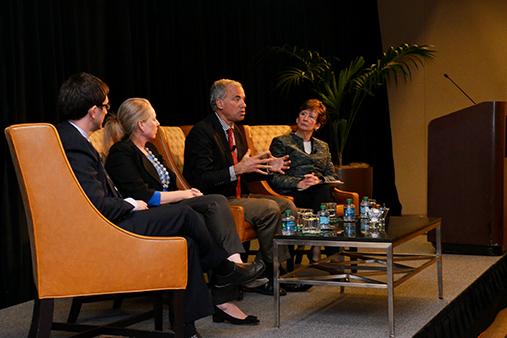Doctors Speak Out on How Patients Can Slow the Spread of Antibiotic Resistant Bacteria
Posted in GUMC Stories | Tagged antibiotic resistance

From left: Dan Merenstein, MD, associate professor at Georgetown University School of Medicine and School of Nursing & Health Studies; Ranit Mishori, MD, MHS, professor of family medicine at Georgetown University School of Medicine; Jesse Goodman, MD, MPH, director of Georgetown’s Center on Medical Product Access, Safety and Stewardship (COMPASS) and Patricia Cloonan, PhD, Interim Dean of the School of Nursing & Health Studies
Dan Merenstein, MD, associate professor at Georgetown University School of Medicine and School of Nursing & Health Studies
Ranit Mishori, MD, MHS, professor of family medicine at Georgetown University School of Medicine
Jesse Goodman, MD, MPH, director of Georgetown’s Center on Medical Product Access, Safety and Stewardship (COMPASS)
DEC. 18, 2015 — Patients have a role to play in minimizing the spread of antibiotic resistant bacteria, and at a recent Doctors Speak Out event, panelists shared strategies with attendees concerned about protecting their own health and the public’s health.
“Antibiotic Resistance: A Global Health Concern” was held Dec. 8 in the Georgetown University Hotel & Conference Center. Jesse Goodman, MD, MPH, director of Georgetown’s Center on Medical Product Access, Safety and Stewardship (COMPASS), said that he and his colleagues at MedStar Georgetown University Hospital and the Washington DC VA Medical Center find themselves treating patients with antibiotic resistant infections on a daily basis.
“Sometimes we say, imagine a world without antibiotics,” Goodman said. “Well, a world without antibiotics could be a world where, if you come into the hospital and have an elective surgery, or if you’re elderly or young and have a chronic disease, this critical element of care that we take for granted may not be there if we continue to abuse antibiotics.”
Common infections, including sexually transmitted ones, and infections of the urinary tract and upper respiratory systems, are increasingly resistant to antibiotics, said Ranit Mishori, MD, MHS, professor of family medicine at Georgetown University School of Medicine. “These are not necessarily life-threatening infections but they can become life threatening because they’re resistant to pretty much everything that we have,” she said.
However, from the perspective of the health care provider and the patient, antibiotics are inexpensive, easily accessible and have few side effects, said Dan Merenstein, MD, associate professor at Georgetown University School of Medicine and School of Nursing & Health Studies. “They’re so easy to use and because of that, you really need to ask, if you’re the patient or you’re a family member, why is this antibiotic being prescribed?” he said.
How Patients Can Help
Mishori encouraged attendees to ask their doctors questions when they receive prescriptions for antibiotics. “If a physician wants to give you antibiotics, ask specifically, do I need this antibiotic?” she said. “Why do I need this antibiotic? And how should I take it in such a way that will minimize potential side effects? And as I’ve said, every drug on this earth has potential side effects. So don’t be embarrassed to ask.”
“I would like to ask everyone to be an empowered patient,” Mishori added. “Ask questions. This is your health. This is your body. The side effects will be borne by you, not by me, so I don’t think we’re going to be offended if you ask what is this for and why should I take it.”
Merenstein suggested that patients focus on a specific complaint when they talk to their doctors. “I always ask patients, ‘What’s the thing that’s bothering you the most?’ because the doctors think that they want an antibiotic for their cough,” he said. “Maybe they just want to get through the night sleeping with their cough. Or maybe it’s their sore throat that hurts. It’s not the antibiotics that they need because they have a viral sore throat. So you really need to tell your doctor what your number one complaint is.”
Washing hands with soap and water is an easy way to prevent the spread of bacteria and viruses, and Mishori said that patients should ask their doctors to wash their hands at the start of an appointment. “I’m not going to be offended,” she said. “I’m trying to make it a habit but the reality is that many of us have not yet made it a habit. So please help us with that.”
Staying up to date on vaccinations to prevent infections from occurring in the first place is another way that patients can avoid unnecessary antibiotics. “Vaccines for children are particularly a tremendous way to address serious diseases and reduce antibiotic use, and even for adults where we have vaccines that need to be improved on like the flu vaccine, it likely does reduce hospitalization and antibiotic use,” Goodman said.
The flu vaccine is imperfect but it decreases incidence of the flu and reduces the severity of flu symptoms among those who get sick, Merenstein said. Mishori agreed that the flu vaccine is important. “The flu of course can contribute to developing pneumonia, so preventing it in the first place is incredibly important so you don’t later have to be faced with an infection that is now resistant,” she said.
Preventing a World Without Antibiotics
Antibiotic resistance is a serious concern but there is hope. “There is a risk that we could face certain infections that we are unable to treat,” Goodman said. “However, I would say that it’s not inevitable and I would say that we can do many, many things and I am starting to see progress, whether it’s developing new treatment approaches, whether it’s physicians and others taking use of antibiotics much more cautiously in an evidence-based way, whether it’s reducing their unnecessary use in agriculture.”
“So there is that risk,” Goodman continued. “But I think to say that we are there now or that it’s inevitable would be incorrect. And you know, we’re here and all of us are engaged in this issue to try to act in all of these different ways to keep that from happening.”
Kat Zambon
GUMC Communications
